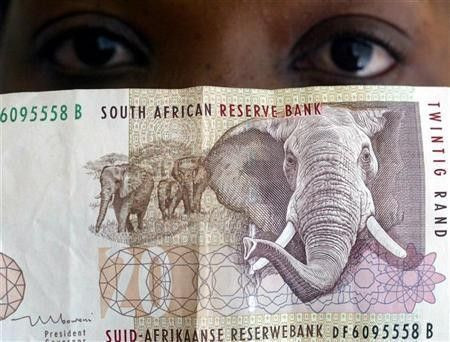S.Africa's rand slides vs dollar, bonds fall

South Africa's rand fell as much as 2 percent against the dollar on Tuesday, breaching 8.0 in thin volumes that exaggerated its moves, before clawing back ground as some players found themselves oversold on the currency.
Government bonds were also weaker, with investors still hesitant to return decisively to high-yielding emerging market assets seen as riskier, while the debt crisis in the euro zone remains unresolved.
The rand hit a session low of 8.0081 to the dollar before recovering to 7.9143 by 1645 GMT, down 0.87 percent from Monday's close of 7.85. It was still in the bottom five of a list of 20 selected currencies from Asia, South America and Africa monitored by Reuters.
The correlation appeared to be strongly on today with the moves of the euro. Once the concerns around the vote in Slovakia started emerging and the euro came under pressure we saw an apathy towards the rand and there was a degree of risk-off, Nedbank currency trader William van Rijn said.
The euro dipped on caution ahead of a Slovak vote on changes to the euro zone's financial rescue fund before turning firmer after outgoing European Central Bank President Jean-Claude Trichet said the common currency was a credible and stable currency.
In relatively thin market conditions, the rand move was probably exaggerated above 8.00. From those levels we returned quite quickly, and once the euro returned to trade back above $1.36, we've seen the rand recover reasonably, but I do feel that it is still on the back foot, van Rijn said.
Government bonds were also weaker, and inversely the yield on the 2015 bond rose eight basis points to 6.7 percent. That on the 2026 note jumped 11 basis points to 8.38 percent.
A weekly government auction earlier showed demand for local debt remains lukewarm after a heavy sell-off by offshore investors in September
The highly liquid nature of the rand makes it vulnerable to swings in portfolio flows and Tradition Analytics said it had, with other emerging market currencies, been hit by liquidity constraints as financial institutions repatriated capital to shore up cash flow positions.
Given the recent news out of the euro zone indicating that authorities are committing themselves to containing the risk of financial contagion, investor sentiment is likely to improve considerably, Tradition Analytics said in a note to clients.
Strategy would dictate buying into EM currency and fixed income asset strength as we near the end of 2011.
Currency percent changes at 1630 GMT. All data taken from Reuters with day's percent changes calculated from Monday's close while year-to date percentage changes are calculated from December 31 2010 close. Minus sign denotes gains.
© Copyright Thomson Reuters 2024. All rights reserved.





















